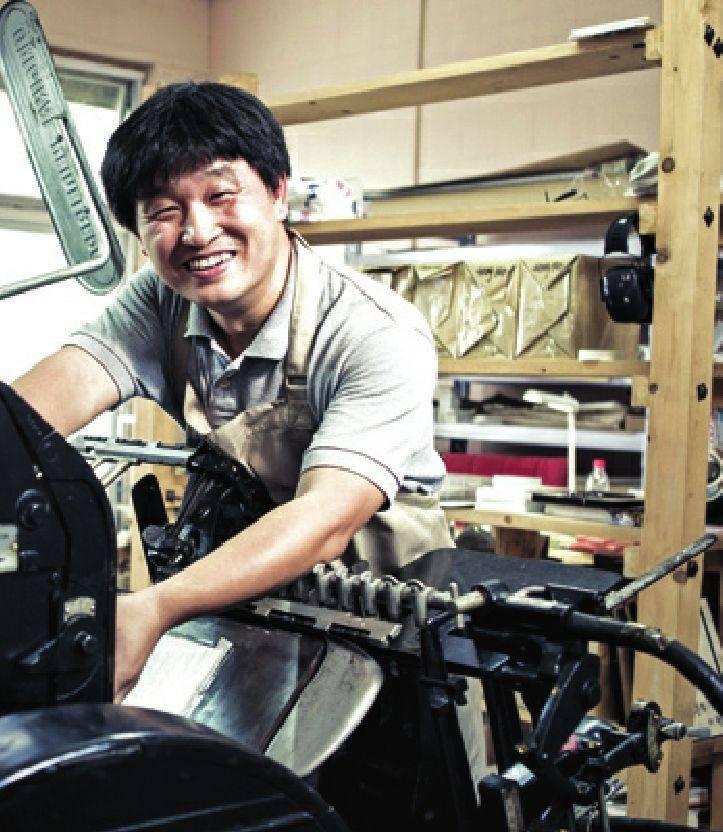Making It Happen
2012-04-29ByLiLi
By Li Li

After losing all his savings in a stock market crash and a bitter divorce in 2008, Cao Shengkang was so depressed that he even thought about taking his own life.
Instead, an invitation from a resort hotel in Tibet Autonomous Region to trade accommodation for his services led to his first backpacking excursion. The life of this 31-year-old blind masseur changed forever.
With the help of his cane and a few good Samaritans, Cao climbed to the top of a snow-capped 5,000-meter mountain summit. “Although I cannot see, I was in awe of Mother Nature when standing there. I felt myself too trivial, and so were my difficulties in life,” Cao said. When his sojourn ended, Cao decided to live a full life for himself as well as for his parents and daughter.
After coming back to his massage clinic in Beijing, Cao found that traveling had become his true passion. A dream of becoming the first blind person to backpack around the world gradually came into focus.
Early in 2012, Cao shut down his clinic despite its handsome returns and went to Sanya in the southern island province of Hainan to learn sailing.
This April, Cao embarked on the first leg of his world tour with a trip through Laos, Thailand, Cambodia and Viet Nam. He set off with a companion, but disagreements forced them to part ways shortly thereafter.
Many difficulties for this lone traveler involved the language barrier. Cao knew only a few English words, including “China” and“blind.” When he was hungry, Cao followed his nose to food stalls. His use of pidgin gestures resulted in some hilarious incidents: He had to unbuckle his pants to signal he was looking for a restroom.
Despite the setbacks, Cao greatly enjoyed his journey. Besides getting help from countless warm-hearted strangers, he said that he was also pleased by local cuisines and fellow travelers descriptions of beautiful scenery. Although the first foreign trip only cost Cao 4,000 yuan ($635), he felt that working as a masseur to save money for his future and support his teenage daughter could delay his plans for his next trip. He plans to go to Singapore and India at the beginning of 2013.
Therefore, Cao went on to raise money on Demohour.com, a crowd-funding platform. Cao posted his goal of raising 60,000 yuan($9,524) and interested parties could pledge as little as 20 yuan ($3.20) or as much as 1,500 yuan ($238). In return, Cao promised that donors would receive postcards that he mails during future trips, a photo album, or even vouchers for his massage service, according to the amount of their “investment.”
During the first 20 days since Caos travel plan went online, 87 netizens pledged their support worth a combined 7,140 yuan($1,133). Although it seemed unlikely that Cao would raise the expected amount of money before his bid became invalid on December 6 as scheduled, he was grateful for the encouraging comments left by people who checked his web page. “I will continue to fulfill my dream, no matter what,” Cao said.
Source of possibilities
Demohour.com, launched on July 4, 2011, shows off the videos of creative people like Cao and their programs as a way of attracting funding support. In return, donors will be rewarded with products and/or services by recipients based on the amount they give. Once a bids fundraising target is met, Demohour.com will take 10 percent. If the fundraising target is not met within a preset deadline, the received funds will be returned to donors accounts.
According to the companys website, the returns cannot be monetary, such as equities or bonds, as Chinas financial regulations forbid it. In this respect it is similar to its American counterpart Kickstarter, which explicitly prohibits its “investors” from making money on the creative projects they sponsor.
Bids on Demohour.com involve industrial design, travel, filmmaking, music recording, photography and publishing. During the first year of the websites operation, 318 bids went on Demohour.com and 150 succeeded in raising enough money, totaling nearly 3 million yuan ($476,190). The bid attracting the largest amount of donations is sponsoring a cartoonist to publish a book on her ongoing fight with lymphoma. Her bid drew 339,500 yuan($53,889) in pledges.
He Feng, a co-founder of this website from Beijing, studied in the United States for seven years and obtained an MBA from Stanford University in 2009. He said that his support for self-expression drove him to set up such a website.
“Creation is the way people try to express themselves. Thats something in short supply in China because the Chinese are poor at expressing themselves,” he said, adding that he hopes that the website can help those who have creative ideas to fulfill their dreams.
With the development of social networks and websites like Demohour.com, creativity and entrepreneurship are flourishing in China.
Sun Yang runs a studio of fine letterpress printing and handmade stationery with a vintage press he bought with the help of Demohour.com.
Back in 2007, Sun, who owned a small but successful design company, saw a letterpress greeting card on a foreign website and was amazed by its beauty and texture. Compared with offset printing, which replaced letterpress printing as the primary way to print and distribute information in the second half of the 20th century, the latter gives visual definition to the type and artwork. From that moment, Sun could not stop dreaming about operating his own letterpress and producing the same fine paper products.
When his search for a letterpress proved fruitless after two years, Sun closed down his company and dedicated all his time to finding his dream machine at the end of 2010. When he eventually found a vintage Heidelberg Windmill press in 2011, he could not find enough money to purchase it, even after borrowing all he could from family and friends.
After Suns fundraising bid went on Demohour.com in August 2011, 463 netizens offered a total of 43,941 yuan ($6,975) over two months, surpassing his original goal of 40,000 yuan ($6,350). The returns for Suns“investors” include greeting cards, upscale stationery and invitations produced by his press.
Other difficulties the 34-year-old paper artisan faced during the initial days of his new studio include borrowing money to make rent and learning how to operate the press through trial and error. Although still deep in debt for his big purchase, Sun is now convinced that his studio will be his lifelong career.
“I admire what actor Will Smith says about dreams in movie The Pursuit of Happiness, ‘You got a dream? You gotta protect it. If people cant do something themselves, they wanna tell you you cant do it,” Sun told Beijing Review.
Sun said that netizens who invested in his studio through Demohour.com had waited patiently for their returns. “I guess the pleasure for them mainly comes from helping a man in need and doing an interesting yet meaningful thing along the way,” he said.
Suns idea is echoed by Zheng Wei, a white-collar worker in an advertising company, who has financed 13 projects on Demohour.com. Zheng told China Youth Daily that it gave him enormous satisfaction when his modest support helps a person to fulfill his or her dreams. Instead of comparing returns between projects, Zheng chose to support projects that he deemed interesting.
Entrepreneurship
Since the beginning of this year, several “many peoples cafes” have been set up in cities across China. Usually, these cafes are founded by around 100 people who have full-time jobs and know each other from the Internet. Individual shareholders investment is as low as 2,000 yuan ($317). Their communication on how to run their cafes is mainly conducted through instant messages online.
Last January, Ge Wen, a young civil servant in Beijing, posted a message on a social networking site calling for people with the same dream of owning a cafe to set one up with each investing 2,000 yuan. This message quickly went viral and eventually attracted more than 100 investors, whose votes are equal in deciding affairs about running the cafe and electing board members.
The cafe was set up last May and this model has been quickly copied in other Chinese cities.
“This new type of micro-entrepreneurship features small inputs of capital, time and energy by a large number of people and a democratic, open and transparent decision-making process,”Ge told China Youth Daily. Ges team won the award of Global Business Top 20, which celebrates creativity in the business world, with another 19 business cases like online scrapbooking site Pinterest in September. The award was organized by Global Business magazine, the School of Economics and Management of Tsinghua University and the Chinese website of Financial Times.
Ge told China Youth Daily by investing in these cafes, people can realize their modest dreams, meet new friends and enjoy life. “It also satisfies them psychologically as they can be entrepreneurs and keep their nine-to-five jobs at the same time,” she said.
